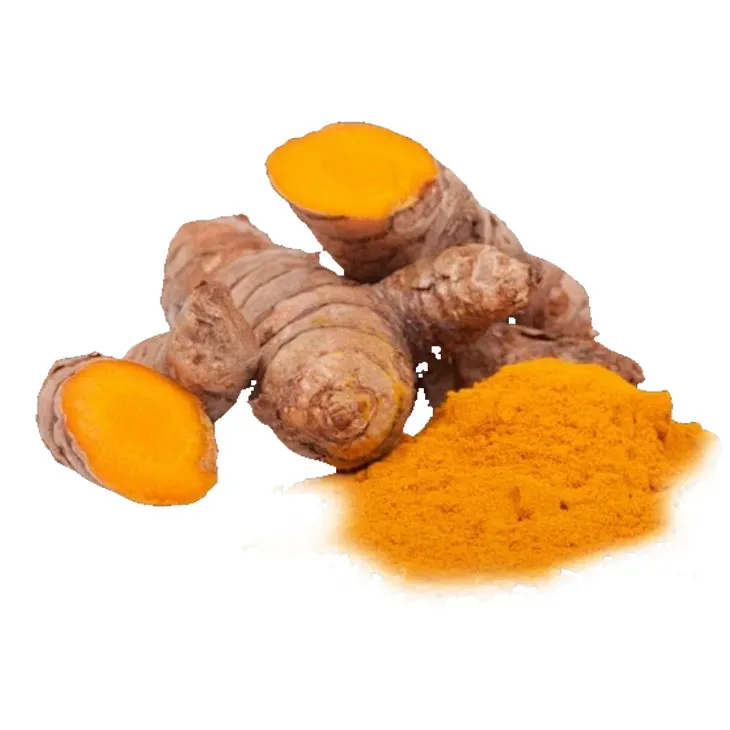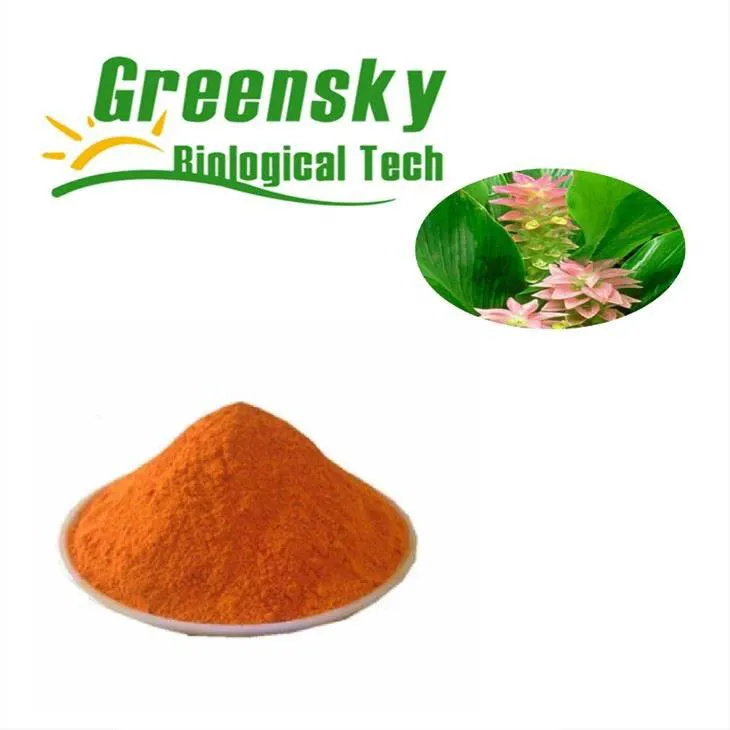- 0086-571-85302990
- sales@greenskybio.com
Curcumin: Is the extract effective for weight loss?
2024-11-13

1. Introduction
In recent years, the search for natural and effective solutions for weight loss has been on the rise. Among the many substances being investigated, Curcumin, an extract from turmeric, has attracted significant attention. Turmeric has been used for centuries in traditional medicine, particularly in Asian cultures, for its various health - promoting properties. Curcumin, as the main bioactive component of turmeric, is being studied intensively for its potential role in weight management. This article aims to explore whether Curcumin is indeed effective for weight loss by examining its impact on different physiological processes related to body weight regulation.

2. What is Curcumin?
Curcumin is a polyphenolic compound with a bright yellow color. It is responsible for the characteristic color of turmeric. Chemically, curcumin consists of diferuloylmethane. It has a complex molecular structure that endows it with a wide range of biological activities. Curcumin is known for its antioxidant, anti - inflammatory, and anti - microbial properties. These properties are not only important for general health but may also play a role in weight loss, as will be explored further in this article.

3. Appetite Regulation
3.1. Hormonal Influence
One of the ways curcumin may contribute to weight loss is through its effect on appetite regulation. Hormones play a crucial role in controlling our feelings of hunger and satiety. Studies have suggested that curcumin can influence certain hormones involved in appetite control. For example, it may affect the levels of ghrelin, often referred to as the "hunger hormone." Some research indicates that curcumin can reduce ghrelin production, which in turn can lead to a decrease in appetite. Additionally, curcumin may also impact leptin, a hormone that signals satiety to the brain. By improving leptin sensitivity, curcumin may help the body better recognize when it is full, thus reducing overeating.
3.2. Neural Signaling
Beyond hormonal regulation, curcumin may also act on neural signaling pathways related to appetite. The brain's hypothalamus is a key region in regulating food intake. Curcumin has been shown to interact with neural receptors in the hypothalamus that are involved in appetite control. It may modulate the activity of neurotransmitters such as serotonin, which is known to influence mood and appetite. By increasing serotonin levels, curcumin may suppress appetite and lead to a reduction in calorie intake. However, more research is needed to fully understand the complex neural mechanisms underlying curcumin's effect on appetite.

4. Thermogenesis
4.1. Mitochondrial Function
Thermogenesis, the process of heat production in the body, is another area where curcumin may have an impact on weight loss. Mitochondria, the powerhouses of the cells, play a central role in thermogenesis. Curcumin has been shown to enhance mitochondrial function. It can increase the activity of certain enzymes within the mitochondria that are involved in energy metabolism. This increased mitochondrial activity can lead to an elevation in thermogenesis, meaning the body burns more calories at rest. For example, curcumin may stimulate the activity of uncoupling proteins in mitochondria, which uncouple oxidative phosphorylation from ATP production, resulting in heat generation instead of ATP synthesis.
4.2. Brown Adipose Tissue Activation
Brown adipose tissue (BAT) is a specialized type of fat tissue that has a high capacity for thermogenesis. Activation of BAT can significantly increase energy expenditure. Curcumin may play a role in activating BAT. Some studies have suggested that curcumin can increase the expression of genes related to BAT function. By promoting BAT activation, curcumin may help the body burn more calories, contributing to weight loss. However, the exact mechanisms by which curcumin activates BAT are still being investigated, and more research is required to confirm its effectiveness in humans.

5. Lipid Metabolism
5.1. Cholesterol and Triglyceride Regulation
Lipid metabolism is closely related to weight management, and curcumin has shown potential in this area. In terms of cholesterol regulation, curcumin may help reduce levels of low - density lipoprotein (LDL) cholesterol, also known as "bad" cholesterol. It can do this by inhibiting the synthesis of cholesterol in the liver. Additionally, curcumin may also have an impact on triglyceride levels. Some research has indicated that curcumin can decrease triglyceride levels in the blood. By regulating cholesterol and triglyceride levels, curcumin may contribute to a healthier lipid profile, which is beneficial for weight loss as abnormal lipid levels are often associated with obesity and related metabolic disorders.
5.2. Fatty Acid Oxidation
Another aspect of lipid metabolism where curcumin may be effective is fatty acid oxidation. Curcumin has been shown to enhance the oxidation of fatty acids in the body. It can increase the activity of enzymes involved in fatty acid breakdown, such as carnitine palmitoyltransferase - 1 (CPT - 1). This increased fatty acid oxidation means that the body is more efficient at using stored fat as an energy source, which can lead to a reduction in body fat mass over time. However, the effects of curcumin on lipid metabolism may vary depending on factors such as diet, lifestyle, and individual genetic differences.

6. Scientific Evidence
There is a growing body of scientific evidence supporting the potential of curcumin for weight loss. In animal studies, curcumin supplementation has been shown to result in significant weight loss, often accompanied by improvements in body composition, such as a reduction in body fat percentage. For example, in a study on obese mice, those given curcumin supplements had lower body weights and less abdominal fat compared to the control group.
In human studies, the results are somewhat more complex. Some clinical trials have reported positive effects of curcumin on weight loss. For instance, a study involving overweight individuals found that those who took curcumin supplements for a certain period showed a modest but significant reduction in body weight and body mass index (BMI). However, other studies have not found such conclusive results. This may be due to differences in study design, such as the dosage of curcumin used, the duration of the study, and the characteristics of the study participants.
7. Considerations for Practical Use
7.1. Dosage
When considering using curcumin for weight loss, dosage is an important factor. The optimal dosage of curcumin for weight - loss effects has not been clearly defined. In some studies, relatively high doses of curcumin have been used to observe significant effects. However, high - dose curcumin supplementation may also carry potential risks, such as gastrointestinal side effects. It is important to consult a healthcare professional before starting curcumin supplementation to determine an appropriate dosage based on individual health status.
7.2. Bioavailability
Another consideration is the bioavailability of curcumin. Curcumin has relatively low bioavailability, which means that a large portion of it may not be absorbed effectively by the body. To improve bioavailability, curcumin is often combined with other substances, such as piperine (found in black pepper). This combination has been shown to increase the absorption of curcumin in the body. When choosing a curcumin supplement for weight loss, it may be beneficial to select one that contains additives to enhance bioavailability.
7.3. Lifestyle Factors
It is important to note that curcumin should not be considered a magic solution for weight loss. Lifestyle factors such as diet and exercise still play a crucial role. A balanced diet rich in fruits, vegetables, whole grains, and lean proteins, combined with regular physical activity, is essential for achieving and maintaining a healthy weight. Curcumin may be used as an adjunct to a healthy lifestyle, but it cannot replace the fundamental principles of weight management.
8. Conclusion
In conclusion, curcumin shows promising potential for weight loss through its effects on appetite regulation, thermogenesis, and lipid metabolism. There is scientific evidence from both animal and some human studies to support its role in weight management. However, more research is needed to fully understand the mechanisms of action and to establish its effectiveness in different populations. When considering using curcumin for weight loss, factors such as dosage, bioavailability, and the importance of a healthy lifestyle should be taken into account. Overall, curcumin may be a valuable addition to the toolkit for those seeking natural ways to support their weight - loss efforts, but it should be used in conjunction with other evidence - based weight - loss strategies.
FAQ:
1. What is curcumin?
Curcumin is an extract from turmeric. It has been widely studied for its various potential health benefits, including possible effects on weight loss.
2. How does curcumin regulate appetite?
Some studies suggest that curcumin may interact with certain hormones or neural pathways in the body related to appetite. It might influence the signals that tell the body when it is full or hungry, but the exact mechanisms are still being explored.
3. Can curcumin really increase thermogenesis?
There is evidence indicating that curcumin may have an impact on thermogenesis. It could potentially increase the body's metabolic rate, causing the body to burn more calories at rest. However, more research is needed to fully understand this effect and its significance in weight loss.
4. What role does curcumin play in lipid metabolism?
Curcumin may affect lipid metabolism by influencing how the body processes fats. It could help in reducing the absorption of dietary fats, promoting the breakdown of stored fats, and regulating lipid - related enzymes. But again, the full understanding of these processes is still evolving.
5. Are there any side effects of using curcumin for weight loss?
When used in moderation, curcumin is generally considered safe for most people. However, some individuals may experience mild side effects such as digestive issues. Also, high doses or long - term use may have other potential but less common side effects, and it's always advisable to consult a healthcare provider before starting any supplement for weight loss.
Related literature
- Title: The Potential of Curcumin in Obesity Management: A Review"
- Title: "Curcumin and Its Impact on Metabolic Syndrome and Weight Loss"
- Title: "Effect of Curcumin Supplementation on Body Weight and Body Composition in Overweight and Obese Subjects"
- ▶ Hesperidin
- ▶ citrus bioflavonoids
- ▶ plant extract
- ▶ lycopene
- ▶ Diosmin
- ▶ Grape seed extract
- ▶ Sea buckthorn Juice Powder
- ▶ Beetroot powder
- ▶ Hops Extract
- ▶ Artichoke Extract
- ▶ Reishi mushroom extract
- ▶ Astaxanthin
- ▶ Green Tea Extract
- ▶ Curcumin Extract
- ▶ Horse Chestnut Extract
- ▶ Other Problems
- ▶ Boswellia Serrata Extract
- ▶ Resveratrol Extract
- ▶ Marigold Extract
- ▶ Grape Leaf Extract
- ▶ blog3
- ▶ blog4
- ▶ blog5
-
Organic Tongkat Ali extract powder factory.
2024-11-13
-
How to make powder with ashwagandha extract.
2024-11-13
-
Rosehip extract manufacturers from China.
2024-11-13
-
The best cat's claw extract in nature.
2024-11-13
-
Chinese Dandelion Leaf Extract Suppliers.
2024-11-13
-
Rose Hip Extract
2024-11-13
-
Panax Ginseng Leaf Extract
2024-11-13
-
Aguaje Extract
2024-11-13
-
Black Garlic Extract
2024-11-13
-
Mangosteen extract powder
2024-11-13
-
Stevia Extract
2024-11-13
-
Dan Shen Root Extract/Salvia Root Extract
2024-11-13
-
Acai Berry Extract
2024-11-13
-
Yellow Pine Extract
2024-11-13
-
Mango flavored powder
2024-11-13





















